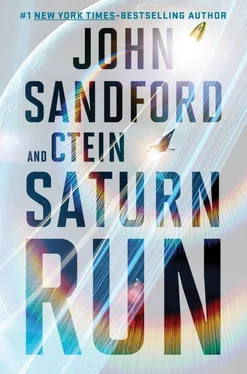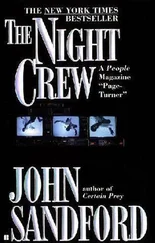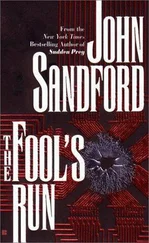All in all, the reaction mass and reactors provided enough power and water to get the Odyssey to Saturn—but they weren’t enough to get the ship there and back, not quickly. The expectation was that the Chinese would harvest water from the moons and rings of Saturn.
The audience in the Oval Office was mirrored by seven billion other human beings, planet-wide. With all pretense of secret missions gone, the whole world was watching the final launch preparations for China’s Saturn mission. Someone in the Politburo with an excellent sense of Chinese history decided his nation’s thrust into an uncertain future needed solid traditional roots.
There were fireworks.
Earth had never seen a show like the one the Chinese put on. State-of-the-art hypergolic engineering was married to pyrotechnic expertise that stretched back fifteen hundred years. A thousand kilometers above the earth, a round of chrysanthemum bursts three kilometers wide blossomed in gold, pink, and white.
People didn’t need vid feeds. Everybody on Earth within line of sight of the ship got a clear view of the display of Chinese history, culture, and power. Even with unaided eyes, earthbound humans on the night side of the planet could see multicolored pinpricks and puffballs of light as the ship passed overhead. With simple binoculars, they could see intricate starbursts, fountains, and sculptural fireballs. The show went on for nine orbits of the earth. Nine times, as the ship passed into sunlight, the fireworks ceased; nine times, as the ship passed into Earth’s shadow, they resumed. Over eighteen hours, seven billion people saw a show of glorious and unprecedented scale.
In the President’s office, Crow conferred quietly with the others.
“Ten minutes,” somebody said.
American intel had projected the likely ignition time. Intelligence had been right about the launch date, and they were pretty sure of the tech, but nothing else was certain. Until the Chinese actually launched, nobody in the U.S. had a solid handle on the Chinese’s target arrival date at Saturn. The best guess was two years and change.
Whatever they had planned, the Chinese were confident enough to be broadcasting live from orbit. Not that it would have done them much good to try to keep the launch secret, but usually they maintained a polite fiction of silence until after a launch. This time, the Chinese had a full professional broadcast crew in orbit, not far from the Odyssey , and they were letting the whole world watch from fifty-yard-line seats.
The Odyssey was roughly over Beijing, bathed in midday sun. The running commentary from the announcer on board the broadcast ship was interrupted by another voice: subtitles on the Oval Office display identified it as that of the Odyssey ’s commander, Captain Zhang Ming-Hoa. He reported to Beijing that all final checks were complete and launch would commence in 10… 9… 8…
Seven seconds later, the monitor flared white for a fraction of a second until the cameras could compensate. For a fleeting millisecond, Crow wondered if the ship had exploded, even half hoped it had. That would solve a lot of problems. But, no, it was those ten massive nuclear engines coming online, their fiery blue-white exhaust much more brilliant than the surface of the sun. The ship started to move away, steadily picking up speed. Within a minute, it was nearly two kilometers away from the cameras, receding at two hundred kilometers an hour. By space travel standards, it was a snail’s pace, but it looked impressive on the big screen.
The status display from U.S. tracking reported that the Celestial Odyssey was accelerating at a tenth of a gee, adding one meter per second of velocity each and every second. That was pretty much what DARPA had expected, or at least hoped. The Chinese hadn’t souped up their engines. They seemed to be more or less the same as they had been for the Mars mission. The big question was, how long would they keep firing?
“All right, everybody out,” Santeros said to the watchers in her office. “I’ll stop down at the situation room every once in a while.”
Crow, Lossness, Vintner, and top military and congressional personnel shuffled out of the office, and walked down to the situation room for the waiting game. In an hour, the Odyssey , now on the night side of the earth, had reached escape velocity.
“No surprise there,” a general said. “Christ, I could use a drink.”
The Chinese engines needed to burn for at least two hours to send the ship to Saturn. The tracking status predicted that if the Chinese cut their engines after two hours, it would take them over seven years to reach Saturn. No one in the situation room expected that to happen, and no one was disappointed.
Three and a half hours after launch, the engines were still firing. Vintner and Lossness looked at each other and then at Crow, who shrugged. Trajectory status reported a velocity of nearly twenty kilometers per second and a transit time to Saturn of under two years. This was shorter than what the ostensibly knowledgeable experts had predicted.
Santeros walked in, talking on a handset, spotted Crow, and her eyebrows went up. Crow nodded toward a monitor. The ship was too far away to be anything but a searing blue-white pinpoint of light, but there was no sign of an engine shutdown. The Odyssey continued to accelerate away from the earth.
“Where are we at?” Santeros asked when she got off the handset.
“Still moving,” Lossness said. “They’re gonna get there in a hurry.”
“How big a hurry?”
“Can’t tell yet, but they’ve already exceeded our projections.”
Santeros lingered, watching the screen, then, after two minutes, said to Crow, “Call me.”
With every passing minute, the Odyssey ’s ETA to Saturn dropped. The five-hour mark passed. Suddenly, the blue-white speck disappeared; it took the cameras a second to adjust, but then, distantly and dimly, a tiny image of the ship could be made out on the monitor. The Odyssey had completed its ejection burn and was free-falling toward Saturn. Status numbers completed their final update. The Chinese nuclear thermal engines had imparted an extraordinary twenty-kilometers-per-second delta-vee to the Odyssey . The projected transit time to Saturn was a year and a half, with an ETA in late April of 2068.
Crow pulled up the timeline for the Nixon . If they stayed on schedule, they’d be launching by the end of 2067, which would have them to Saturn just about the same time as the Chinese. Not good. He called Santeros, and five minutes later he, Vintner, and Lossness were back in the Oval Office.
“This isn’t acceptable,” Santeros said. “Best case, we and the Chinese are there at the same time, and that’s a powder keg waiting to blow up in our faces. Worst case, our schedule slips and they beat us to whatever’s out there. We need to get there faster. I don’t care how you make it happen, but make it happen.”
She looked up into thin air and said, “Gladys, tell the kitchen to send fresh pots of coffee to Vintner’s office, then meals for Crow, Vintner, and Lossness.” The White House computer pinged acknowledgment. “Jacob, Gene, figure this out. Call in whatever resources you need. Crow, I want you in on this so you can report back to me and in case any of their ideas have security implications we need to be on top of. By the morning briefing, I want to know how we’re going to beat the Chinese to Saturn.”
Crow had been running on catnaps for two days, trying to stay on top of last-minute intelligence about the Chinese launch. More stim pills.
Two hours later, in Vintner’s office, the three of them were well-caffeinated and fed, but they weren’t any happier. Crow massaged his forehead. “So, really, there’s no way to speed up the trip? Neither of you geniuses can come up with anything?”
Читать дальше








